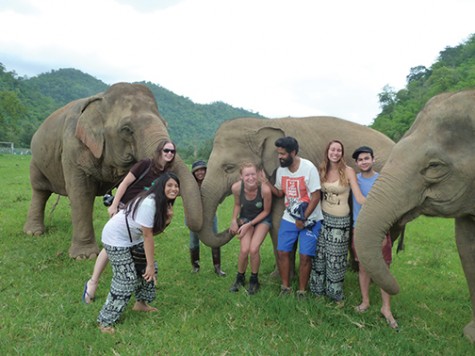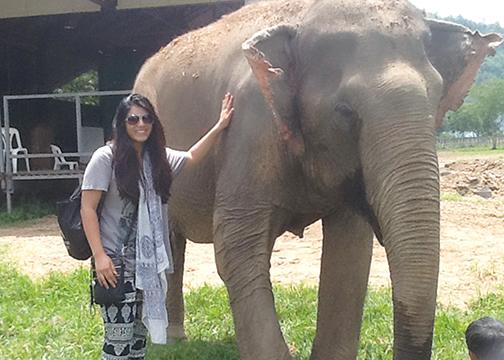While some college students focused on their tan this summer, public health senior Chaminie Dhalayan dedicated her time to volunteering at an elephant sanctuary in Thailand.
“I knew I was going to study abroad in Thailand this summer for my international experience requirement, so I decided to do some research on reputable elephant sanctuaries that I could volunteer with while there,” Dhalayan said. “I’ve always been drawn to elephants they are some of the most intelligent, socially intricate creatures in the world. They are capable of complex emotions and are also known to be highly altruistic meaning they often help other species in distress.”
But upon further research into the matter Dhalayan found it more difficult to find an elephant sanctuary that was internationally recognized as humane and ethical. Eventually, Dhalayan found the Elephant Nature Park located in the Chiang Mai province of Northern Thailand.
The Elephant Nature Park was established in 1990 and is not only a sanctuary but a rescue center for elephants in distress. The park also specializes in rain forest restoration, cultural preservation and visitor’s education all while remaining independent of political movements and pressure groups.
“Most of the elephants living at the park were rescued from the logging, trekking and circus industries within Thailand where many endured severe physical and psychological abuse,” said Dhalayan. “I am so fortunate to have volunteered at such a reputable elephant sanctuary because many elephant centers in Asia force their elephants to paint and perform in shows using cruel methods of training.”
One of the most common techniques to domesticate these gentle giants is called “crushing.” According to National Geographic, crushing is when the elephants are tortured into submission often using extremely tight ropes and sticks that have nails piercing through them. The idea is to crush the elephant’s spirit. This practice has taken place for many years and many trainers believe the elephants cannot be tamed without this method but there are other alternatives. In many American zoos they use a technique called “protected contact,” which trains the elephants using positive reinforcement rather than negative reinforcement. Even though this new method exists, it has proven to be quite difficult to instill in the minds of traditional Thai trainers.
While Dhalayan is sure most people know about the stories of elephant poaching in Asia and Africa she hoped to shed light on how to help.
“According to experts, if we do not take action now wild elephants in Africa could be extinct by the year 2025,” Dhalayan said.
Though preventing elephant extinction is not an easy task, there are many simple ways people can help. One way is by not buying any products that contain ivory. Another way is by supporting organizations, like the International Fund for Animal Welfare, that pressure governments to reduce the distribution of ivory within their countries, and last not supporting circuses or unrecognized elephant centers.
 While volunteering at the Nature Park, Dhalayan had many duties including shoveling feces, bathing and playing with the elephants. Watching the elephants interact with each other without human interference was her favorite part of the program.
While volunteering at the Nature Park, Dhalayan had many duties including shoveling feces, bathing and playing with the elephants. Watching the elephants interact with each other without human interference was her favorite part of the program.
“It was really special to see them interact with each other naturally, like they would in the wild and is something I would never forget,” Dhalayan said.
In the future, Dhalayan hopes to return to Thailand and continue the work she started with the Elephant Nature Park. For now she is content with getting her health science degree.
For those who have upcoming study abroad trips or just international trips in general and want to volunteer, Dhalayan offers some advice.
“Do some research!” she said. “Make sure that the organizations you want to volunteer for are legitimate and are widely recommended, volunteering as an eco-tourist was truly an unforgettable experience that I believe everyone should try at least once.”
The Elephant Nature Park has many volunteer opportunities including becoming a Cambodia volunteer, where students would work with the Cambodia wildlife sanctuary to help protect 1 million acres of jungle habitat. Another opportunity to make a difference is to become a vet volunteer: students would work side by side other veterinarians to secure the health of the animals and even a dog rescue volunteer.
To work with the Elephant Nature Park all you have to do is go to their website at and fill out one of their volunteer applications. The commitment can range from one to eight weeks and can be an life-changing experience.










